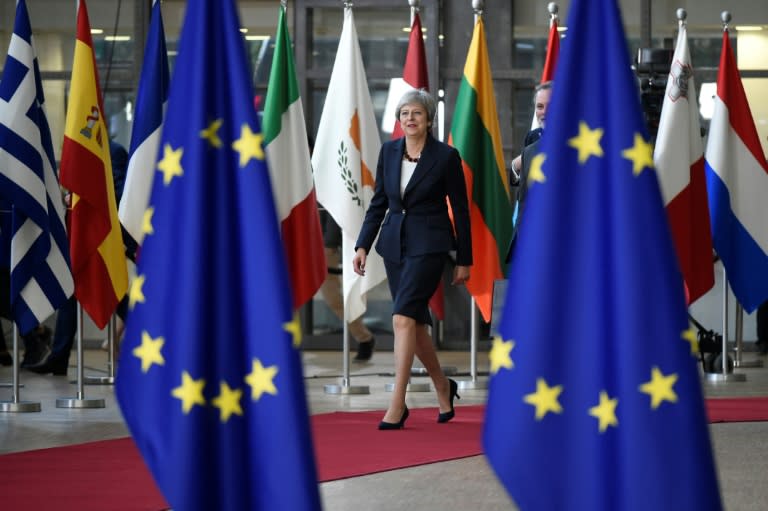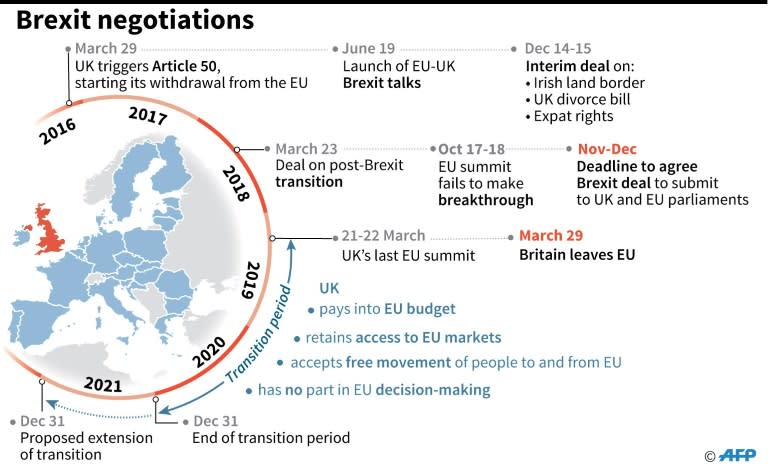UK PM fires back at mutinous party over Brexit
Britain's beleaguered Prime minister appealed to her increasingly mutinous party on Monday to back her Brexit strategy in the face of deep divisions at home and a tough negotiating stance from the EU. Theresa May told a raucous sessions of parliament she was not afraid of strong criticism while negotiating more agreeable terms for Britain's exit from the European Union in March. "If doing those things means I get difficult days in Brussels, then so be it," she said over the din of jeers from the opposition as well as some members of her own party. "The Brexit talks are not about my interests. They are about the national interest –- and the interests of the whole of our United Kingdom." May has come under unrelenting attack in the closing stages of Brexit talks that still cannot find a suitable way to keep the border open between EU member Ireland and North Ireland, which is part of the United Kingdom. She returned from an unproductive summit in Brussels last week to a new and more intense round of rumours about an imminent leadership challenge from within her party's most staunch pro-Brexit wing. One newspaper quoted an unnamed MP saying May was entering "the killing zone". Another said: "The moment is coming when the knife gets heated, stuck in her front and twisted." May's appearance in parliament thus turned into a nationally televised test of her resolve. She measured her words carefully and never lost her cool as she tried to paint herself as a leader who stood above politics and looked after the nation's interests first. "I do think that it is important that we all consider the language that we use, those of us in public life," May said. - 'Misogynistic language' - The graphic nature of the media attacks appeared to unsettle even some of May's biggest critics. Yvette Cooper of the opposition Labour Party denounced the "violent, dehumanising and frankly misogynistic language". But nearly every MP's disapproval of the quotes was followed by condemnation of May's handling of the negotiations. "This government is terminally incompetent and hamstrung by its own divisions," Labour leader Jeremy Corbyn said. MPs in her own party criticised her for being open to the idea of extending until 2021 the post-Brexit transition period in which the details of future trade terms are to be ironed out. Some in Labour said May should choose much closer permanent relations with the bloc. And still others in Labour urged her to respect the wishes of hundreds of thousands of people who turned out in London on Saturday demanding a second Brexit referendum. - No compromise on Ireland - The gulf in the positions defended by May on Monday and Brussels is wide. May's terms for extending the post-Brexit transition period are not acceptable to the EU. Brussels further wants to keep Northern Ireland aligned with EU customs rules and regulations for the duration of continued talks on a permanent solution. May flatly rejected this in a rare article published in the mass-selling The Sun tabloid. European Parliament's Brexit negotiator Guy Verhofstadt said a deal could still be prepared for a new summit in mid-December because a no-deal Brexit was "not in the (interest of the) EU and certainly not of the UK". Only a few weeks ago negotiators had been hoping to finish things by November. The stakes for May are rising quickly at home. Her Northern Irish allies in the Democratic Unionist Party (DUP) are threatening to vote against next week's budget if the deal results in any special status for the province. A group of eurosceptics said up to 41 Conservative MPs could this week also back an attempt to enshrine enshrine a pledge not to put "trade or regulatory barriers" for trade between Northern Ireland and the mainland Britain into law.



